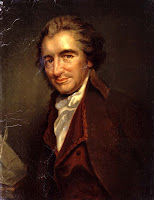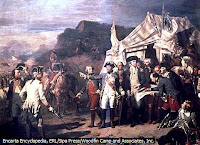
 William Penn born in London October,14,1733. He spent the earlier years of his life in Essex and some of it in Ireland. He went to school and studied in Christ Church in Oxford. It was there when he converted to Quakerism. He was a good friend of the Quakers for example Nathanael Greene. He also spent most of his life in England, though is well known for the earlier history that he had in America, for this trip he served many different purposes.
William Penn born in London October,14,1733. He spent the earlier years of his life in Essex and some of it in Ireland. He went to school and studied in Christ Church in Oxford. It was there when he converted to Quakerism. He was a good friend of the Quakers for example Nathanael Greene. He also spent most of his life in England, though is well known for the earlier history that he had in America, for this trip he served many different purposes. One thing that Penn did that changed the colonies is that he tried to improve the indians, this is something most other Quakers would not think of. He also was for religous freedom, and was a protagonist of religious toleration. Penn was a person the would rule everything in his area (pennslyvannia) and Ben Franklin was a colonial representive and was trying to and wanted to fight his descendents which would be the Penn family. Him being like this would also help others with being what they want to be like and is also a step closer to being free in everything. Penn also tried to improve the rights of all English men. He went and was thinking that if Holland had a wealthy country and was for religious tolerance, then maybe his country should be. This could be a way to get money.
 One time he went and started preaching to hundreds in front of a meeting house of the Quakers after it being padlocked by the authorities. After the meeting Penn and William Mead were arrested and put in prison for inciting a riot. At Penn's trial he calming told the illegality of the proceedings against him. He was like this with the whole religion thing because he did not like Roman Catholics for example a person would be like Daniel Carroll, he wanted everyone to be free from there religion. He also wanted wealth for his country by immigrants coming here. He also wanted to be just like Holland and they had the freedom of religion. Penn also went and helped the Americans become closer to the Indians and for the Indians to make negotiated peacefull purchases.
One time he went and started preaching to hundreds in front of a meeting house of the Quakers after it being padlocked by the authorities. After the meeting Penn and William Mead were arrested and put in prison for inciting a riot. At Penn's trial he calming told the illegality of the proceedings against him. He was like this with the whole religion thing because he did not like Roman Catholics for example a person would be like Daniel Carroll, he wanted everyone to be free from there religion. He also wanted wealth for his country by immigrants coming here. He also wanted to be just like Holland and they had the freedom of religion. Penn also went and helped the Americans become closer to the Indians and for the Indians to make negotiated peacefull purchases.  I think that Penn should be known as a greater hero in history, then what he stands in right now. He helped a large society have religious freedom, and allowed them to be in what they believe. Not what they are told to believe. Now where would this country be if we had to believe in things we didn't, it such a great disturbance that we cant even imagine. This whole country would go downhill and so much rage would be going on that we wouldn't be able to help ourselves. I could be even worse than the great depression.
I think that Penn should be known as a greater hero in history, then what he stands in right now. He helped a large society have religious freedom, and allowed them to be in what they believe. Not what they are told to believe. Now where would this country be if we had to believe in things we didn't, it such a great disturbance that we cant even imagine. This whole country would go downhill and so much rage would be going on that we wouldn't be able to help ourselves. I could be even worse than the great depression. 








